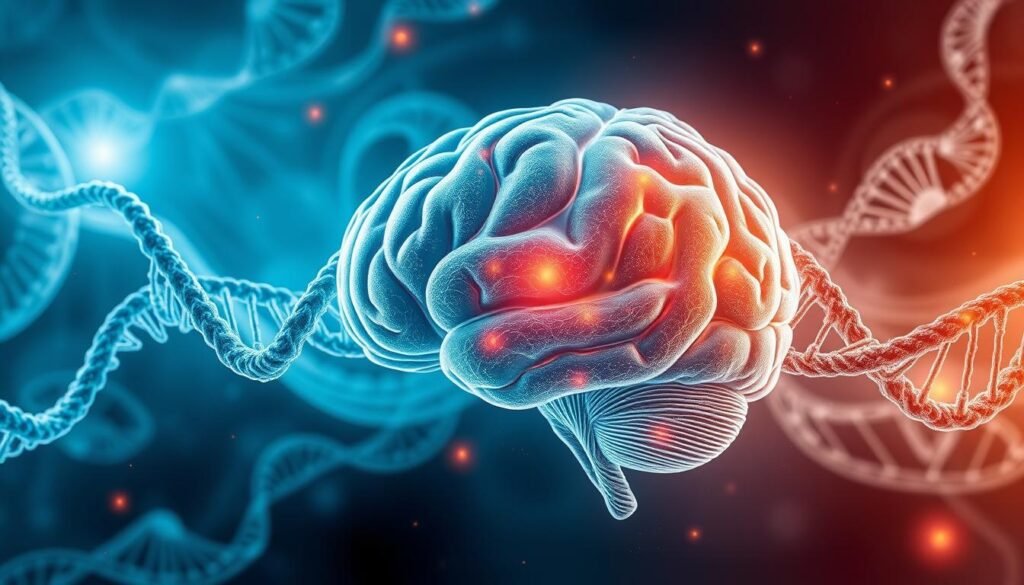Studies have found interesting results regarding identical twins and anxiety. If one twin struggles with anxiety or depression, the other twin has up to a 60% chance of experiencing the same. This rate is notably higher than in fraternal twins. It points to a genetic connection to these mental health issues.
Experts are looking into how genes and environment work together. They agree both greatly impact the development of anxiety. For instance, people who get anxiety or depression before 20 are likely to have relatives with similar issues. This suggests our genes play a big role in whether we might face anxiety.
Looking into twin studies shows us more about this genetic link. The research is clear. There’s a strong case that your genes can make you more likely to have anxiety disorders.
Key Takeaways
- Identical twins share a much higher chance of developing anxiety if one is diagnosed compared to fraternal twins.
- Family members of those with early-onset anxiety show increased susceptibility to similar mental health issues.
- Research indicates a genetic heritability factor of approximately 31.6% for generalized anxiety disorder (GAD).
- Genetic links to anxiety include discovered risk loci on various chromosomes through genome-wide studies.
- Understanding family history is crucial in recognizing and addressing anxiety symptoms.
Introduction to Anxiety Disorders
Anxiety disorders affect a lot of people, making daily life harder. About 30% of adults will face anxiety disorders at some stage. These conditions can change how someone functions day to day. Anxiety comes in several forms, such as Generalized Anxiety Disorder (GAD), Social Anxiety Disorder, and Panic Disorder. Each type brings its own set of problems.
For example, GAD causes ongoing and excessive worry over daily things. Meanwhile, those with Social Anxiety Disorder might be very scared of social situations. This fear can be very overwhelming.
Symptoms of anxiety disorders often include:
- Excessive worrying
- Panic attacks
- Avoidance of certain situations
- Physical symptoms such as increased heart rate or sweating
The biological basis of anxiety includes genes and the environment. Some families might notice anxiety is more common among them, showing it can be inherited. While genetics might make someone more likely to have anxiety, life events like stress play a big part too. It’s key to look at both these aspects to really understand anxiety disorders.
Understanding these factors helps in treating anxiety better. It shows why it’s crucial to consider both inherited traits and personal experiences. For a deeper look into how anxiety and genetics are linked, check out this exploration of anxiety and genetics.
The Link Between Genetics and Anxiety
Genetics play a key role in how some people are more likely to have anxiety. Studies show that anxiety can be passed down through families, due to certain genes. For example, genetic research has found complex links between genes and anxiety.
Defining Genetic Factors in Anxiety
Some genes have been linked to anxiety disorders. The RBFOX1 gene, found in a study from 2015, might make people more likely to get generalized anxiety disorder. Other research found links between phobias, panic disorders, and specific genetic changes. Twin studies show that genetics account for about 50% of anxiety symptoms.
This evidence means genes significantly affect who might develop anxiety disorders.
Role of Family History in Anxiety Disorders
Having family members with anxiety can affect your mental health. If your family has a history of anxiety, you might be more at risk. This includes a tendency to feel more negative emotions or neuroticism. Knowing this can help us understand our own mental health better.
It highlights the need to consider family traits in mental health assessments. Acknowledging genetic factors can improve prevention and treatment of anxiety.
Is Anxiety Hereditary? Understanding Heritability
Studies show a strong hereditary link in anxiety, leading many to wonder if it’s hereditary. Over 1 million participants in genetic studies found 100 genes tied to anxiety. This shows how anxiety inherited traits impact mental health.
The heritability of anxiety disorders shows genetics play a part. For example, generalized anxiety disorder (GAD) has a heritability rate of about 30%. Social anxiety varies more, with rates from 27% to 76%, and panic disorder’s heritability is between 28% and 44%. These numbers suggest anxiety disorders often run in families.
The age when anxiety first appears can indicate genetic risk. If anxiety starts early, genetics might be more involved. Anxiety also often comes with other issues, like depression or schizophrenia, making genetics more complex.
Community support is crucial for those facing anxiety. There are platforms that provide connection and help. For more information, take a look at community support options for mental health needs.
| Anxiety Disorder | Heritability Rate (%) |
|---|---|
| Generalized Anxiety Disorder (GAD) | 30 |
| Social Anxiety Disorder | 27 – 76 (varies) |
| Panic Disorder | 28 – 44 |
Genetic Factors Contributing to Anxiety Disorders
Studying anxiety disorders shows a mix of genetics and behavior. Scientists found specific anxiety genes that play a big part in anxiety’s roots. This shows how these conditions can pass down in families.
Common Genes Associated with Anxiety
Research has found several genes that affect anxiety disorders. For example, the serotonin transporter gene (5-HTT) helps manage serotonin. This brain chemical affects mood and anxiety. Changes in this gene can make people more prone to anxiety.
Genes linked to neuroticism and brain-derived neurotrophic factor (BDNF) also impact emotional health. Knowing these anxiety genes helps find who might get anxiety disorders.
The Role of Endophenotypes in Anxiety
Endophenotypes are heritable traits linked with anxiety disorders. They show how genetic traits appear as visible signs. This idea connects genetic risk factors to actual symptoms of anxiety.
By studying endophenotypes, doctors can create better treatment plans. Genetic tests are getting better, helping predict how well treatments will work. This advances the management of anxiety disorders.

Environmental Factors Influencing Anxiety
Environmental factors greatly affect the start of anxiety disorders. Stressful events like trauma, loss, or constant stress can set off anxiety. These events hit harder on people more likely to get anxious. Anxiety isn’t just inherited. It comes from a mix of genes and big environmental effects.
Where you stand economically can also raise anxiety levels. People with less money face more stress, making anxiety worse. Facing discrimination or stigma because of race or gender adds stress. This stress boosts the role environmental factors play in anxiety.
Anxiety’s complexity shows in how outer factors and genes interact. If you worry about anxiety being in your family, know how outside factors play a part. Even though some anxiety comes from families, environment matters too. Looking at both genes and stresses can help us get anxiety better.
| Environmental Factors | Impact on Anxiety |
|---|---|
| Stressful Life Events | Can trigger onset or worsening of anxiety symptoms |
| Trauma | Increases likelihood of developing anxiety disorders |
| Socioeconomic Status | Higher stress levels and limited resources lead to increased anxiety |
| Discrimination | Heightens feelings of unease and contributes to anxiety |
For more on how environmental factors and anxiety connect, read here.
Interaction Between Genes and Environment
The way our genes and environment work together is key in anxiety disorders. Anxiety family history makes some people more prone to environmental stress. This shows how inherited traits and external factors combine, affecting anxiety levels.
The Gene-Environment Interaction Explained
Our genetic makeup influences how we handle stress from our environment. For example, people from anxious families may be more stress-sensitive. This gene-environment interaction implies that life experiences affect if anxiety genes develop into symptoms. Traumatic events or ongoing stress can make anxiety worse in these cases.
Examples of Environmental Triggers
Many external factors can trigger anxiety, especially for those genetically at risk. Some triggers include:
- Childhood Trauma: Early bad experiences can deeply affect someone’s emotional state.
- Chronic Stress: Long-term stress from personal problems can be overwhelming.
- Major Life Changes: Big changes like moving or switching schools can lead to anxiety.
- Substance Abuse: Using drugs or alcohol might worsen genetic vulnerabilities.
Understanding these triggers helps mental health experts find and help those at risk. Knowing the gene-environment interaction adds depth to grasping anxiety disorders. This aids in better managing mental health.

The Importance of Family History in Recognizing Anxiety
Knowing how anxiety family history impacts us helps us see signs of anxiety in relatives. Genetics is key in making some more likely to get anxiety disorders, like Generalized Anxiety Disorder (GAD). Anxiety can show up in families as similar ways of acting, feeling, and dealing with problems. This shows why it’s crucial to notice patterns in the family.
How Family Traits Influence Anxiety Symptoms
Studies show people with GAD often have relatives who are also anxious. This link may come from things in our environment or traits passed down in families. Kids whose parents have anxiety disorders are seven times more likely to face similar issues. This highlights how knowing your family’s mental health history is key to understanding anxiety.
Signs of Anxiety to Watch For in Family Members
Knowing the signs of anxiety can help us get help sooner. Signs to look for include:
- Excessive worry about different parts of life
- Physical signs like being on edge or tired
- Problems with sleeping well
- Feeling tense and getting annoyed easily
- Staying away from certain places or situations
Also, knowing if there’s a history of major depression or substance abuse in the family can change how we see anxiety. Spotting these signs lets families talk about mental health more openly. This leads to getting help and support early on.
| Signs of Anxiety | Potential Impact |
|---|---|
| Excessive Worry | Can lead to decreased quality of life and avoidance behaviors |
| Trouble Sleeping | May exacerbate anxiety symptoms and impact overall health |
| Tense Muscles | Physical discomfort can interfere with daily activities |
| Agitation | Increases irritability and clashes in interpersonal relationships |
| Avoidance Behavior | Can result in isolation and further entrenchment of anxiety |
Noticing these signs in families tied by anxiety family history creates a caring space. Being more aware helps give timely help and better mental health for those dealing with anxiety.
Research Findings on Anxiety and Genetics
Research has shown that genetics play a big role in anxiety disorders. Many studies supporting genetic involvement show how important genes are in anxiety. Twin studies help us understand how anxiety traits are passed down.
Studies Supporting Genetic Involvement
A study of over 3,500 twins found that genetics are partly responsible for anxiety. It showed that genes make up about 54% of what causes anxiety disorders. About 40% of the risk for anxiety and depression is genetic.
Environment matters too, but not as much, making up 18%-28% of the risk. This shows that both our genes and our surroundings affect our mental health.
Insights from Twin Studies
Twin studies have taught us a lot about how anxiety changes or stays the same over time. For instance, genetic factors cause 68% of the same anxiety symptoms to reappear. Different anxiety traits coming from the environment also matter.
Behaviors related to anxiety in kids can predict future disorders. This shows how key it is to understand genetics for early help.
Early Onset Anxiety and Its Hereditary Aspect
Early onset anxiety can really impact how a child grows and handles daily life. Studies show a big hereditary aspect to this, meaning anxiety disorders often run in families. This means kids might get their anxiety from their parents.
About half of our anxiety traits come from our genes. Twin studies show that genes play a role in childhood anxiety. So, kids with family members who have anxiety are more likely to have it too.
Children and parents share genes which can influence anxiety. This shows how important it is to understand family risks. The role of parents, especially dads, changes as child anxiety changes. Dads getting more involved might help manage a child’s anxiety better.
Anxiety starting young can lead to bigger problems later. It’s crucial to catch and treat anxiety early. Doing so might stop other issues like depression from developing.
Parents need to watch for early signs of anxiety in their kids, like being really shy or cautious. Knowing about the hereditary side of anxiety helps everyone involved care for the child better.
The Complexity of Anxiety Disorders
Anxiety disorders are complex and come from many factors. Genetics, life events, and the environment can all play roles. Knowing why is key to making good diagnosis and treatment plans for each person.
Why Anxiety Symptoms Vary Among Individuals
The link between genetics and anxiety symptoms is strong. Genetics can really affect the chance of getting anxiety disorders. For example, kids of parents with generalized anxiety disorder (GAD) have higher risks.
Studies show genetics and personality, like neuroticism, are connected. Twins studies reveal genetics influence GAD and other anxiety problems. But, personal experiences and specific triggers also shape how anxiety shows up in people.
Diagnosis and Treatment Implications
Tailored treatment is crucial because genetics affects anxiety disorders. Knowing one’s genetic risk helps pick the right treatment strategies. GAD has a genetic heritability estimate of about 31.6%.
This means genes play a part, but it’s not the whole story. Successful treatment mixes genetic info, family history, and personal psychology. This approach leads to better care for those with anxiety.

Strategies for Managing Anxiety
Managing anxiety is best done with a mix of methods and support. For many, especially those with a family history of anxiety, counseling and changes in lifestyle are key. These steps help reduce symptoms and boost well-being.
Proactive Counseling and Support
Getting professional help is essential for dealing with anxiety. Cognitive behavioral therapy (CBT) is a top method. CBT tackles fears head-on, helping you do things you used to avoid. Counseling sessions offer techniques and a place to talk, making you feel less alone.
Lifestyle Changes to Mitigate Anxiety Risks
Making lifestyle changes can lower anxiety levels. Here are some top tips:
- Balanced Diet: Eating well helps your mood and energy. Foods like fruits and veggies are good for your mind.
- Regular Exercise: Staying active helps fight anxiety. Even light exercise can ease stress and relax you.
- Mindfulness and Relaxation Techniques: Yoga, meditation, and breathing exercises promote calmness.
- Quality Sleep: Good sleep is important for managing mood and anxiety.
If anxiety runs in your family, these lifestyle changes can make you stronger mentally. Talking about anxiety with family helps too. These steps are great for handling anxiety and living healthier.
Conclusion
The topic of anxiety being hereditary is not easy to figure out. Studies show a strong link between family history and the risk of anxiety disorders. For example, Social Anxiety Disorder (SAD) is more common in children of affected parents. Twins studies also support the idea that anxiety can be passed down in families.
Anxiety disorders come from both genes and the environment working together. The natural shyness of a parent and certain gene mutations can make someone more prone to anxiety. Knowing that anxiety can be inherited is key to dealing with it effectively. Genetic counseling offers valuable insights, helping families to handle and possibly reduce anxiety risks.
Knowing about genetic factors allows people and their families to look for treatments that work best for them. This knowledge helps in creating better management plans for anxiety disorders. It changes how anxiety is treated and can lead to better results for those affected.